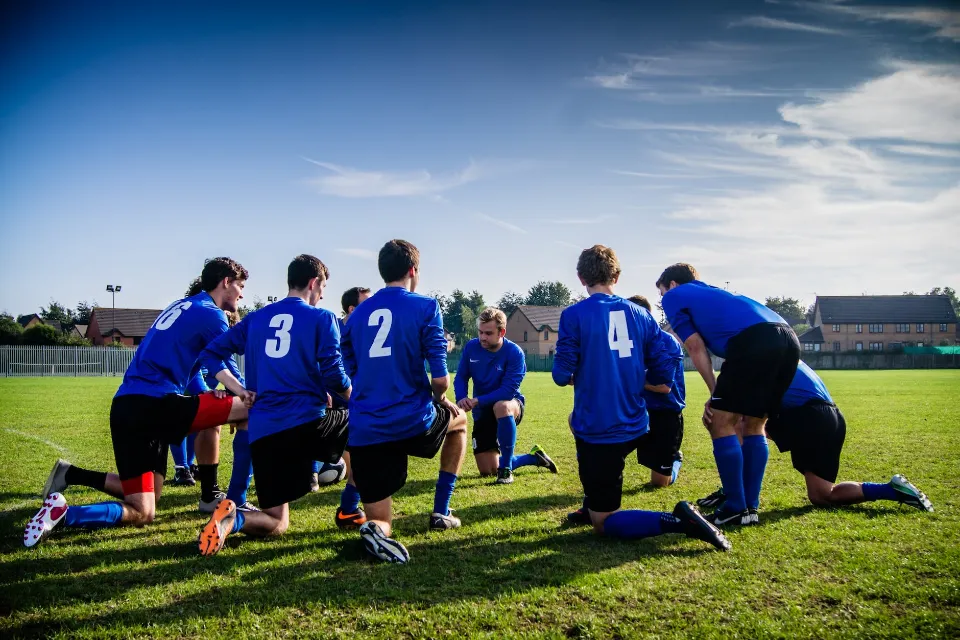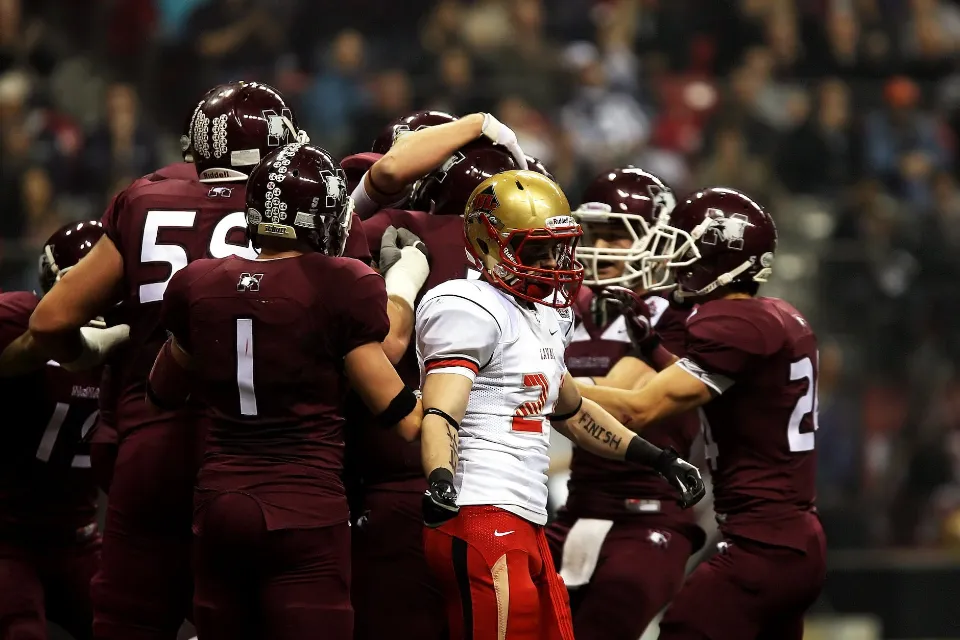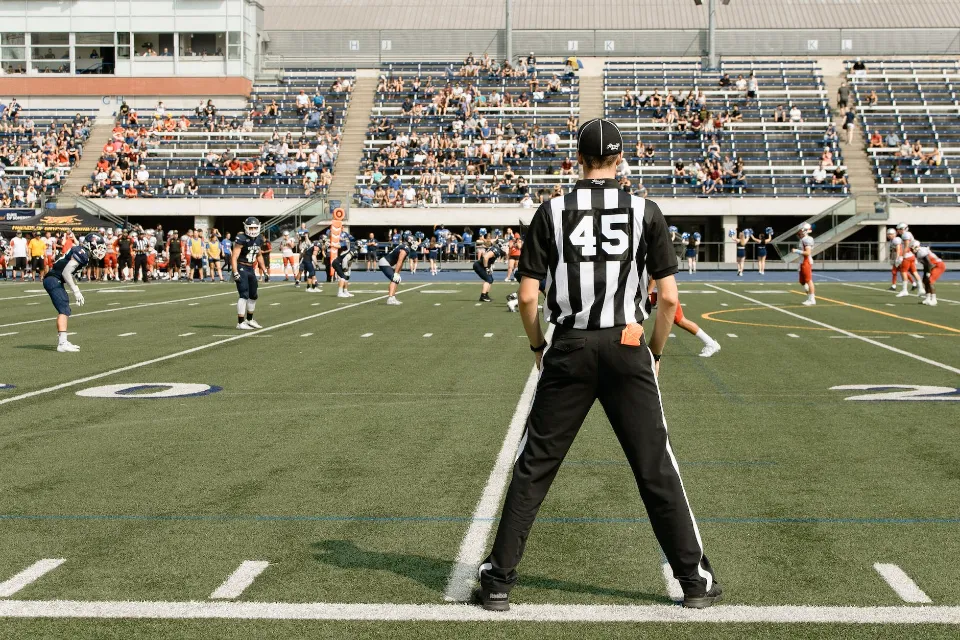
Can You Play Two Sports in College? Is It Possible?
Do you want to learn more about how to become a multi-sport athlete? Learn everything you need to know about participating in two sports while in college by reading on.
If you are passionate about two sports it can be heartbreaking to decide which one to pursue in your collegiate career. The question is: can you play two sports in college?
Yes, you can play two sports in college. However, depending on the division, participating in two sports in college could be one of the most difficult challenges of your life, particularly if they are D1 sports. Decide which of the two sports you are most passionate about, and focus all of your attention on that one.
The number of sports you can play in college and the requirements for success are discussed below.
Can You Play Two Sports in College?
You are not restricted to a certain number of sports in college. However, taking part in multiple sports during the same season can be very challenging.
Related:
- Do Community Colleges Have Sports?
- What Are The Most Popular College Sports In America?
- Why College Athletes Should Be Paid?
Any D1 athlete will tell you that balancing classes, practices, and training is difficult. Without proper time management, D1 athletes playing only one sport can become fatigued and feel stretched thin. Your life might become much more difficult if you attempt to add another sport to the mix.
24 sports and 90 championships are offered by the NCAA. If you have your mind set on playing more than one sport, choosing sports with different seasons is best. This allows you to focus on one sport per season, which leads to better game performance and allows for more time to focus on academics outside of games and practice. It might be simpler to play two sports at the D2 or D3 levels because they typically require less practice and training.
See Also:
- Can You Attend Two Colleges at Once?
- Is It Better to Go to Community College First, Then Transfer?
- How to Transfer from Community College to University?
- Can You Take Classes at a Community College While Enrolled in University?

Do College Coaches Like Athletes Who Play Two Sports?
Athletes who participate in two sports are preferred by college coaches. Your ability to quickly switch between your various athletic abilities is demonstrated. It demonstrates your commitment to staying active and your love of sports.
Coaches want to know if you have the motivation to persevere through the arduous practices year after year. In college sports, you will need to quickly change positions and make play adjustments.
Can You Get a Scholarship for Two Different Sports?
It is extremely uncommon for a student-athlete to receive scholarships to compete for two different teams, though it is not impossible.
As we’ve previously mentioned while being able to play two sports in high school successfully demonstrates your adaptability and time management abilities, doing so in college is a completely different animal.
Maintaining your GPA will be just as important to keeping your scholarship money as your athletic accomplishments, so don’t let it slip your mind. It goes without saying that participating in two sports would make this more challenging and that having two scholarships would increase your risk.
Are There Any Sports That Fit Together in College?
Football and track & field are two sports that naturally complement one another. However, if they concentrate on finding the right opportunity and, more importantly, the ideal coaching staff that will enable them to balance what, in most situations, will be a challenging task, most athletes will only be able to participate in two sports in college. Trying to do so while still maintaining good grades is not easy, but it is possible if you are determined to make it work.
Baseball, basketball, and soccer are just a few of the many other sports that could be appealing choices for students looking to play multiple games in college. Finding a place where you can try out for various teams can be challenging, but before making a choice about your next step, it’s important to consider what each school has to offer.

If you want to play baseball, for instance, you should check to see if your top-choice university has any openings on the team. The same is true for track and field and soccer. When selecting the best school for you, you should also take into account whether you want to live on or off campus.
You’re less likely to be able to participate in multiple sports, generally speaking, the more selective the university. However, there are some lesser-known universities in America that permit their athletes to play on more illustrious teams if they so choose.
Pros and Cons of Playing Two Sports in College
These are the benefits and drawbacks of participating in two sports in college.
Pros
- Cross-Training
Cross-training has some benefits. Our bodies like variety. This is why at the gym, we concentrate on a different set of exercises every day. You’ll train for both teams if you play on two, which will help you become more physically fit overall by building endurance and strengthening muscles that you might not use if you only play one sport.
Through the variation, you can, when done correctly, reduce your risk of overuse injuries. But if you don’t train wisely, you might have stress-related problems.
- More coachable
Exposure to two different coaching styles makes you a better listener and better able to adapt your play and practice to the coach. You should develop the habit of seeking out constructive criticism as a player so that you can benefit from the wisdom of those who have more experience than you do. You’ve doubled your opportunities to learn and develop by participating in two sports with two different coaches.
- Increased chances of being recruited
Playing two sports can increase your odds of getting recruited. Let’s say you play football and basketball. You might receive some offers for a college football team if you don’t receive many for college basketball teams.

Keep in mind, you’ll have to play both sports well in order to truly increase your chances. You might want to think twice about joining two teams if doing so will prevent you from excelling in at least one of them.
- Not having to choose between two passions
Let’s say you share a love for both sports. You made an effort to choose one, but you were unsuccessful. You can indulge in both passions while in college by participating in both sports. Additionally, you won’t get as bored with them if you participate in two sports.
Cons
- Physical risks
Let’s say you play football and sprain your ankle during a practice session. Although your coach won’t be pleased, they will handle it. They are aware that any sport will inevitably result in minor injuries. You’ll be back in playing shape after a short nap.
Imagine you play cross-country running and football. Your football coach won’t be happy to know you injured your leg during a cross-country meet. Due to an injury that could have been prevented if you only played one sport, they are currently down one player.
Additionally, your body could quickly become exhausted if you participate in two D1 sports. You won’t have much or any energy left for studying once you’ve finished all the practice and training.
- Commitment and time
College sports are on a whole other level when compared to high school sports. You will learn that practicing and working out takes up a significant portion of your day if you read about playing at the D1 level. You only enroll in two or three classes per semester because your practice and training are so demanding. To give yourself more time to focus on them, some people even advise enrolling in more difficult courses during the summer.
A second D1 sport might mean less time for classes and studying. What if you’re too exhausted to concentrate on your studies or your classes? That might result in a new scam.
- Expenses
You already know how much college costs. Playing two D1-level sports could mean taking longer to complete college and graduate. Without a scholarship, you might be paying more for college than you should. If you choose to live off campus, these costs also cover rent for an apartment or room and board.

Do Colleges Like Two-sport Athletes?
Research suggests competing in multiple sports competitively is a double-edged sword in the eyes of a college coach.
On the one hand, continuing to compete in multiple sports has many advantages, both physical and non-physical. Tyler Johnson outlined five main factors in a piece for Stack.com outlining why colleges adore bringing in multisport athletes. He draws his reasoning from conversations and research with coaches as well as physicians. Here’s a summary of what he argued:
- Multisport athletes get injured less often—Stack cited research from the American Orthopaedic Society for Sports Medicine and orthopedic surgeon Dr. Nirav Pandya, saying “Athletes run a higher risk of developing overuse injuries if they play the same sport all year long because they must repeatedly use the same muscle groups and motions. The evidence is overwhelming that student-athletes compete in a variety of sports, which helps them use and strengthen different muscle groups.”
- Athletes who participate in multiple sports are more coachable; in practice, this means they get better at listening, observing, and adapting to any coach the more diverse coaching environments and team environments they are exposed to.
- Multisport athletes have more opportunities to be competitive—Stack reasoned that coaches like players who are constantly thinking competitively; striving to be the best and improve themselves in any way they can. Coaches believe that this way of thinking is essential for success on and off the playing field, which is why they advocate for playing multiple sports at once.
- Playing multiple sports ensures a smoother transition into other positions—This means that playing multiple sports requires a natural versatility, both physically and mentally. High-level student-athletes may be asked to switch positions because college sports frequently involve injuries or the need for tactical adjustments. Coaches are more likely to make this request of players they are confident can handle such adjustments and succeed.
- Multisport athletes have “higher ceilings”—Multisport athletes may not know the ins and outs of a particular sport expertly, but their diverse physical training makes them better pure varsity athletes who a coach can teach the finer points as they go. Because of this, they have greater potential for greatness.
The advantages of participating in multiple varsity sports as a prospective student-athlete seem limitless, but there may also be expenses involved.
Conclusion: You Can Play Two Sports in College
So you can play two sports in college? You can, but should you play two sports in college? Weighing the benefits and drawbacks is your best option. If you’re committed to playing both sports, it’s not going to be easy and it can be a big challenge.
It has been done before and requires a high level of athleticism if playing two sports is your dream. You might be able to do it if you find the right school and playing level for you.
FAQs
Has Anyone Ever Played 3 Sports in College?
Luke Urban did it all. Sure, many athletes participate in multiple sports, and many of them do so at a high level. Examples include football, basketball, baseball, and hockey. But Urban was able to play professionally in two sports—football and baseball—while also earning letters in four different sports at his alma mater, Boston College.
Can You Get a Scholarship for Two Sports in College?
It is possible to earn an athletic scholarship for more than one sport. Particularly at the NCAA Division I level, it doesn’t occur very frequently. There are more athletes who compete in more than one sport at Division 2, 3, and NAIA levels.
What Sport is Best for Ivy League?
Specialized sports that are not offered at many high schools like crew, fencing, and pole vaulting are typically the strongest at Ivy League schools.


